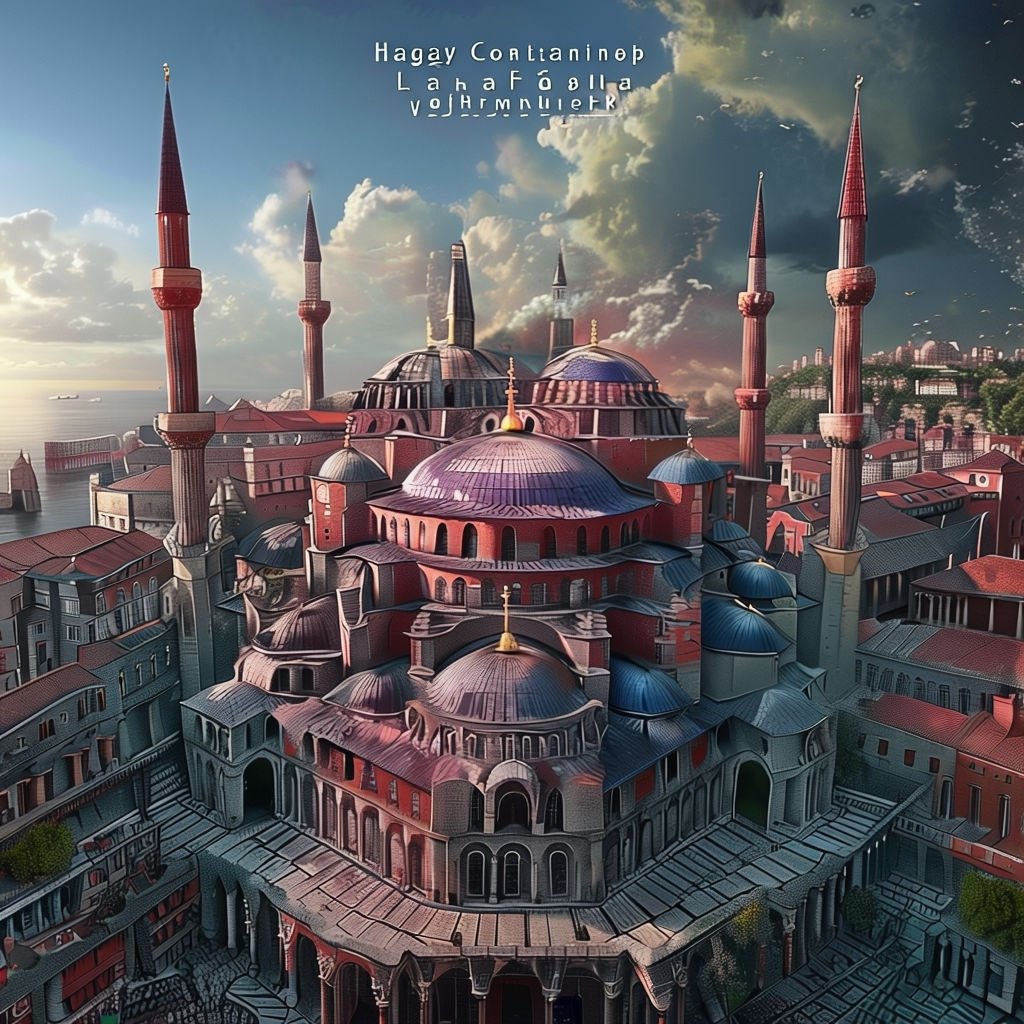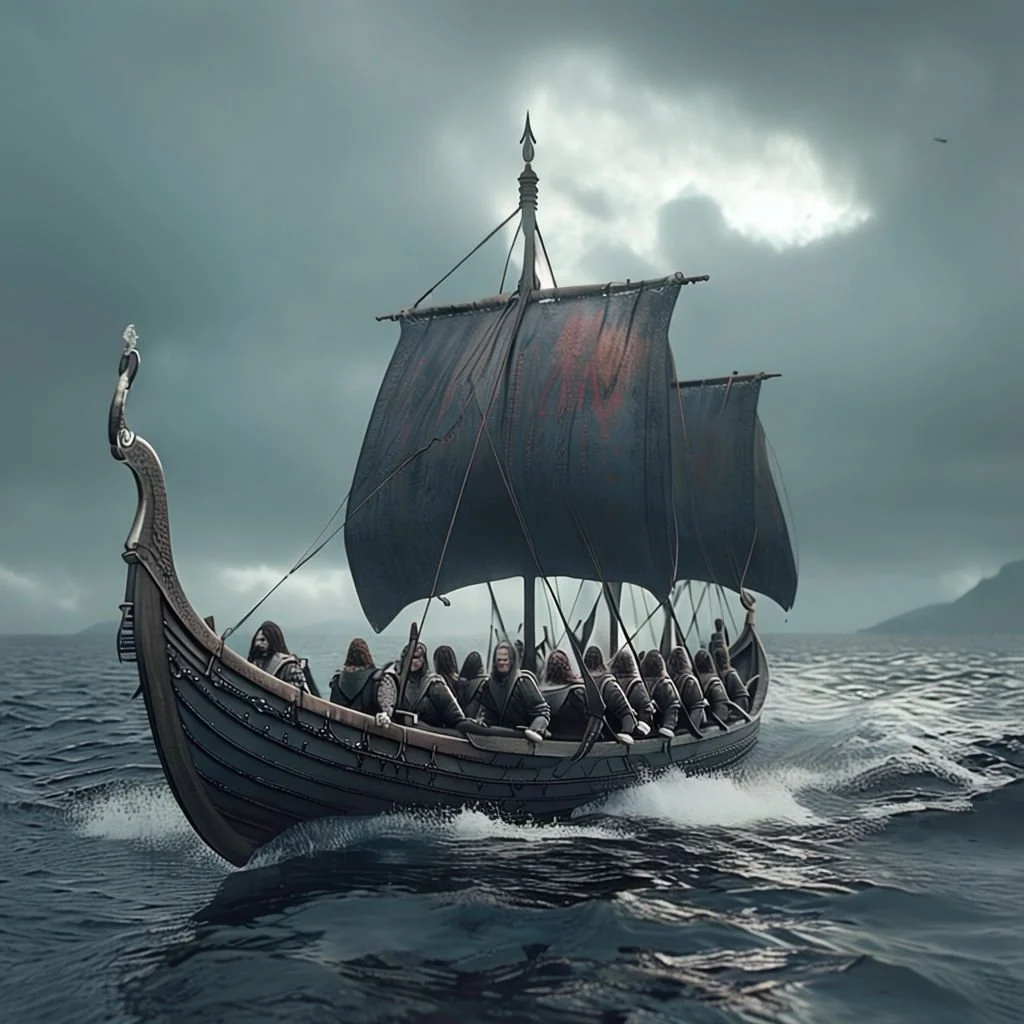The Rune of Harmony: A Tale of Botulf Gerisson The Gnostic Guard
The scent of saltwater clung to the air, mingling with the hum of distant waves as Botulf Gerisson stood at the bow of his longship, eyes fixed on the horizon. The Dnieper River stretched endlessly before him, winding its way southward toward the Black Sea. Beyond that vast expanse of water lay the fabled city of Miklagard—Constantinople. The great city was said to glitter like a jewel amidst the East, a place where the riches of the world came to rest, and where men like Botulf, hardened by the northern winters and tempered by battle, sought both fortune and destiny.
But Botulf was not merely chasing coin. His journey was driven by something deeper, something that whispered to him in the night—like the voice of the Norns who wove the fate of men. He had heard the tales of the Varangian Guard, the northern warriors who served as the elite protectors of the Byzantine emperor. The strength of their arms and the ferocity of their hearts had carved them a place of honor in the emperor's court, but it was in the shadows of those tales that Botulf had heard something else: rumors of the sacred and the profane, of wisdom hidden beneath layers of ancient stone.
Miklagard was more than a city of trade and war—it was a crossroads of belief. For the devout citizens of the Byzantine Empire, it was the beating heart of Christendom. But beneath its shimmering surface, older currents ran deep. Among the stone parapets of the Hagia Sophia, within the great halls of the emperors, and across the marble streets where shadows flickered, there lingered an ancient knowledge.
Botulf had heard the name whispered on the lips of traders and monks alike: Sophia, the Gnostic goddess of wisdom. They spoke of her not in fear, but in reverence—though her vision was not one of the emperor's faith, nor the gods of Botulf’s homeland. Sophia's wisdom transcended borders, calling to those who sought something beyond the physical realms of power and wealth. She offered enlightenment, a vision of oneness that even the most devout could not fully grasp.
It was this calling, this mysterious voice of the Divine Feminine, that stirred within Botulf as he journeyed southward. He was a man of the sword, raised in the cold halls of the north, his life a testament to the Viking ethos of honor, battle, and glory in Valhalla. Yet, as the longship sliced through the river's dark waters, a sense of anticipation built within him. It was as though the land itself whispered the name of Sophia—urging him to discover the true meaning of power, not in brute strength, but in the knowledge that transcended life and death.
By the time Botulf’s boots touched the stone streets of Constantinople, his heart had already begun to change. The city’s grandeur overwhelmed him, its sprawling markets filled with goods from every corner of the world. His place as a Varangian Guard was secured, yet his mind could not settle. The ancient marble walls of the Hagia Sophia called to him, just as they had called to those who came before him—silent witnesses to centuries of belief, conquest, and mystery.
And it was there, in the cool shadows of the great church, that Botulf experienced a revelation. Before the stone carvings and towering arches, the vision came to him as though summoned from the depths of time. Sophia, in all her radiant wisdom, appeared not as a goddess, but as the embodiment of the Divine Feminine—the very essence of creation. She spoke of oneness, of a universe that echoed with the harmony of the soul, far beyond the limited visions of men. Hers was a wisdom that transcended the gods of battle and bloodshed, offering instead a path of unity and balance.
This moment, this awakening, changed Botulf. He no longer saw the world as a warrior did, through the lens of conquest and valor. Instead, he saw the interconnectedness of all things—the harmony of existence, and the divine energy that flowed through everything. No longer was he bound by the ethos of Valhalla. He now sought a different kind of immortality—one that could be attained through wisdom, not war.
And so, in a moment of quiet, Botulf did what few men had dared. He carved his name into the marble parapet of the Hagia Sophia, marking his place not as a soldier of fortune, but as a seeker of truth. His rune would stand for ages, a testament to the Northern warriors who had come to serve the empire, but also a symbol of something greater—a connection between worlds, a bridge between the Viking soul and the Gnostic vision of Sophia.
The city of Miklagard would become his home, and though he would live and fight as a Varangian Guard, Botulf Gerisson carried with him a wisdom that transcended the blade. The divine melody of Sophia sang within him—a song of oneness that he would follow to the end of his days.
In the great city of stone and gold, he had found more than he had ever hoped. He had found the path to a heaven not built on conquest, but on the eternal wisdom of the soul.
—
Botulf Gerisson stood atop the walls of Constantinople, his gaze drifting over the expanse of the city he now called home. The sun was setting, casting a golden light over Miklagard, the Great City. The call to prayer echoed from the distant towers of the Hagia Sophia, mingling with the sounds of the bustling markets below. He rested his hand on the hilt of his sword, a habit he’d developed after years of service as a Varangian Guard. His duties were clear: protect the emperor, guard the empire. But within him, something far deeper stirred—a call that transcended the sharp edge of his blade.
It had been twenty years since Botulf arrived in Constantinople, seeking fortune and honor among the elite warriors who guarded the Byzantine emperor. In those early years, his sword had been his voice. His loyalty, his dedication to duty, had earned him respect within the ranks of the Varangian Guard. He had fought in campaigns from Sicily to the Holy Land, his axe cleaving through the enemies of the empire. He was a warrior born, raised in the northern traditions of Odin and Thor, with the promise of Valhalla awaiting him after death. Or so he had once believed.
But Sophia had changed him.
Her vision had come to him in the quiet moments, in the sacred shadows of the Hagia Sophia. Botulf had knelt before the altar, where the light filtered through the ancient mosaics, when he first felt her presence. The Gnostic goddess did not speak in words, but through the quiet whisper of understanding. She showed him a world not ruled by blood and conquest, but by harmony, unity, and wisdom. In her vision, all things were connected, all life part of a greater whole. The warrior within him had struggled against this revelation at first, but over time, he had learned to embrace it.
As the years passed, Botulf began to find a balance between the life he had known and the new path laid before him. He remained a Varangian Guard, loyal to the emperor and the empire. His duty was clear: protect the realm from the enemies that surrounded it. But Sophia's wisdom had taught him to see beyond the immediate violence of war. Instead of seeing his enemies as mere adversaries to be slain, he began to understand them as part of the larger tapestry of existence. Each life he took weighed on him now, not with guilt, but with the awareness that every action rippled through the cosmos, like a stone cast into a still pond.
On the battlefield, Botulf’s prowess remained unmatched, but now he fought with purpose beyond the sword. He fought to preserve balance, not to claim victory for victory’s sake. He saved lives when he could, sparing those who sought mercy, and treating prisoners with dignity, much to the confusion of his fellow Varangians. They did not understand the change in him, though they respected his strength. They had not seen what he had seen—had not heard the quiet voice of Sophia, guiding him toward a higher truth.
The emperor himself had taken notice of Botulf’s wisdom. In court, when disputes arose, the Varangian was often called to stand as a voice of reason. His judgment was valued, his insight trusted. Though still an outsider in many ways, Botulf had become a pillar of stability within the empire. He was known not only for his sword but for his mind, a rare balance that few warriors ever achieved.
Yet it was in the quiet moments, when he stood before the marble walls of the Hagia Sophia, that Botulf truly felt at peace. His hand would trace the runes he had carved so many years ago, a testament to his journey from warrior to seeker of wisdom. In those runes, he had left his mark—not as a conqueror, but as a man who had found a deeper truth.
One evening, after a particularly grueling campaign, Botulf returned to the Hagia Sophia. His armor was scarred, and his muscles ached from days of battle. The city was safe once more, the enemies of the empire pushed back. But as he stood before the grand cathedral, he felt a strange calm wash over him. The battles of men seemed distant, their importance diminished in the face of the eternal.
He entered the Hagia Sophia and knelt before the altar, as he had done many times before. The candles flickered softly in the twilight, and the air was thick with incense. Botulf closed his eyes, seeking Sophia’s guidance, as he had done for so many years.
In the silence, she came to him. Not as a vision of light, but as a presence—subtle, soft, yet powerful. Her wisdom filled his mind, reminding him that life was not a series of battles to be won, but a journey toward understanding and unity. In her presence, he felt the weight of his sword lift, as though the burdens of war no longer defined him.
He had served the empire well. He had defended its borders and upheld his duty as a Varangian Guard. But Sophia’s vision reminded him that there was more to life than duty and battle. He had found harmony between the warrior he had been and the seeker of wisdom he had become. His life was no longer solely about service to the emperor—it was about service to the greater good, to the balance of the universe itself.
As he stood to leave, Botulf’s hand lingered on the stone, where his runes had been carved so long ago. He smiled, a rare softness on his weathered face. The city of Miklagard would always be a place of power, of politics, of battles won and lost. But for him, it had become a place of peace, where the warrior and the sage could coexist.
And as the city settled into the quiet of night, Botulf Gerisson, the Varangian Guard, walked away from the cathedral with a lightness in his step. He was at peace, both with himself and the world around him. Sophia had shown him the way, and he would follow her wisdom until the end of his days, knowing that true victory lay not in the sword, but in the harmony of the soul.
—
MIKLAGARD - THE GREAT CITY




